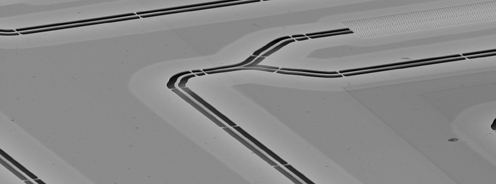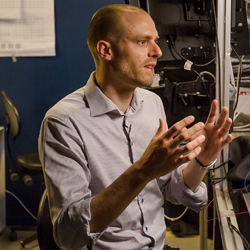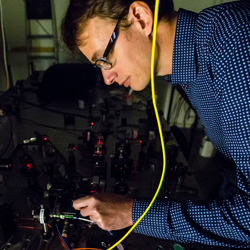Quantum technology boosted by 20 million kroner from the Ministry of Science
Denmark has a strong position in the field of quantum technology with world-class researchers. The research is conducted in four of the country’s universities and in order to strengthen the foundation for Danish research, the Danish Agency for Science, Technology and Innovation has awarded 20 million kroner to a new centre, QUANTECH, which will build up a research infrastructure comprised of a facility with a number of instruments for producing photonic and electronic quantum components.

The figure shows a prototype of a nanoscale component for optical quantum technology. Within QUANTECH, Danish researchers will gain access to state-of-the-art equipment for the manufacturing of and measurements on a wide range of quantum components. (Credit: Leonardo Midolo).
Quantum physics deals with the properties of matter at the atomic level. Through decades of dedicated basic research, researchers have gained so much control over the strange phenomena of quantum physics that they are working to utilise the unique properties of quantum mechanics for fundamentally new and practically applicable products and a wide range of possibilities for new technology.

We have received large grants for research in quantum physics and this has really taken the research a long way. But research grants are primarily given to employ researchers and if we are to develop new technology, we also need the resources for the development manufacturing of equipment, says Søren Stobbe associate professor in the Quantum Photonics research group at the Niels Bohr Institute and co-owner of Sparrow Quantum. (Foto: Ola Jakup Joensen)
“We have received large grants for research in quantum physics and this has really taken the research a long way. But research grants are primarily given to employ researchers and if we are to develop new technology, we also need dedicated equipment for the development of new quantum devices. It is therefore of great importance that we have now been granted 20 million kroner from Danish Agency for Science, Technology and Innovation for a new centre, QUANTECH, which will be used for the development and fabrication of components for future technology,” explains Søren Stobbe from the Quantum Photonic research group at the Niels Bohr Institute at the University of Copenhagen.
Future perspectives
Research in quantum physics is carried out at Aarhus University, the Technical University of Denmark, DTU, University of Southern Denmark and the Niels Bohr Institute at the University of Copenhagen. The new centre, QUANTECH, will primarily be located at the Niels Bohr Institute at the University of Copenhagen with a smaller facility at the Technical University of Denmark, DTU.
The research areas cover a wide range and there are great perspectives for quantum technology, for example, for lightning fast computers with unprecedented computing power, data communication that cannot be intercepted and ultra-sensitive sensors for diagnosing various diseases with extremely precise measurements of, for example, electrical impulses in the brain.

The new centre allows for the development of ‘state-of-the-art’ quantum components. The development of a reliable single photon source is a first step towards a future where photonic quantum technologies can be applied in, for example, quantum simulators, unbreakable encryption or perhaps even a quantum based internet, says Peter Lodahl professor and head of the Quantum Photonic research group at the Niels Bohr Institute co-owner of Sparrow Quantum. (Foto: Ola Jakup Joensen)
Professor Peter Lodahl and Associate Professor Søren Stobbe from the Niels Bohr Institute research quantum technology based on light, called quantum photonics and in order to control the light all the way down to the individual photons they have developed a kind of photon gun, which is built into an optical chip. It is this kind of nanostructures that the researchers will be able to continue developing in a focused manner at the new centre.
“The new centre allows for the development of ‘state-of-the-art’ quantum devices. The development of a reliable single photon source is a first step towards a future where photonic quantum technologies can be applied in, for example, quantum simulators, unbreakable encryption or perhaps even a quantum based internet. It will boost the entire development,” says Peter Lodahl, who together with Søren Stobbe has started a new company, Sparrow Quantum, which will produce the photonic chips for quantum technology based on light.
The Danish Agency for Science, Technology and Innovation has granted 20 million kroner to establish the research infrastructure. The universities will co-finance with an equal amount, so the total amount is expected to be nearly 41 million kroner.

Peter Lodahl, Professor, founder and co-owner of Sparrow Quantum and head of the Quantum Photonic research group at the University of Copenhagen. Tel: +45 2056-5303, lodahl@nbi.ku.dk
Søren Stobbe, founder, co-owner and CEO of Sparrow Quantum, Associate Professor in the Quantum Photonic research group at the University of Copenhagen. Tel: +45 3532-5216, +45 6065-6769, stobbe@nbi.ku.dk
Topics
See also:
Niels Bohr’s 131st birthday
|
